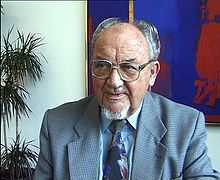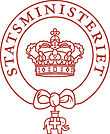Anker Jørgensen
| Anker Jørgensen | |
|---|---|
 | |
| Prime Minister of Denmark | |
| In office 5 October 1972 – 19 December 1973 | |
| Monarch | Margrethe II |
| Preceded by | Jens Otto Krag |
| Succeeded by | Poul Hartling |
| In office 13 February 1975 – 10 September 1982 | |
| Monarch | Margrethe II |
| Preceded by | Poul Hartling |
| Succeeded by | Poul Schlüter |
| Personal details | |
| Born | 13 July 1922 Copenhagen |
| Political party | Social Democrats |
| Spouse(s) | Ingrid Pedersen |
| Children | 4 |
| Religion | Lutheran |
Anker Henrik Jørgensen (born 13 July 1922) is a former Danish Prime Minister and Foreign Minister. Between 1972 and 1981 he led five cabinets as Prime Minister. He led or represented the Social Democratic Party for well over 30 years. His legacy is ambivalent. Politically he is considered by many to have been largely unsuccessful and having failed to mitigate the impact of the economic crisis of the 1970s and 1980s. Nonetheless he is generally respected and even loved throughout Denmark for his personal integrity and down-to-earth personality, often exemplified in his refusal of moving into the official Prime Minister residence Marienborg, preferring to stay with his wife in their small apartment in a working class area of Copenhagen.[1] He has been described as not having the image of a strong or visionary leader, but through his down-to-earth and earnest demeanor he managed to maintain a wide support for the Danish welfare state in the population.[2] In 1992 he was chosen to travel to Iraq to negotiate the release of a group of Danish hostages with Saddam Hussein, a task which he successfully accomplished.
Early political and personal life
Anker Henrik Jørgensen was born on 13 July 1922 to Johannes Albert Jørgensen and Maria Jørgensen who both died while he was a child. He was brought up by close members of his family. He studied at the school of the Royal Orphanage, but left school after the 7th grade to work at a warehouse. Through his job as a warehouse worker he became active in the Special Workers' Union, and in the Social Democratic party.[3]
In 1948 he married Ingrid Kvist Pedersen (17 August 1922 – 18 October 1997) whom he remained married to until her death in 1997. They had 4 children. Throughout this period, he lived in the working-class area of Sydhavnen, an inner city district of Copenhagen. In 2008, 86 years old, he finally left the Sydhavnen apartment, moving to an elder care center.
He began his political carer early, and in 1950 he became a member of a trade union. He led the Danish Workers Union, SiD, between 1968 and 1972. Whilst he was chairman of the Danish Workers Union, he was elected to the Parliament of Denmark for the first of many times in 1964.[2] As a representative of the unskilled workers he sometimes had rivalry with the leadership of the skilled workers' unions, such as LO, The Danish Confederation of Trade Unions, and its leader Thomas Nielsen, who referred to Jørgensen as "a complete idiot".[4]
As a member of parliament he was responsible for labor related issues. He located himself on the left wing of the Social Democratic party, speaking out for unskilled workers and the jobless, and criticizing the leadership of Parliamentary group leader Per Hækkerup. He also gained attention for his vocal critique of the United States engagement in the Vietnam War. Before the 1972 referendum about whether Denmark should join the European Union, he went against the stated interest of his own labor union, arguing for a yes. In October Prime Minister Jens Otto Krag appointed Jørgensen as his successor.[2]
Prime Minister and later years
In 1972, he succeeded Jens Otto Krag as Prime Minister of Denmark following the European Union Referendum of that year. He held this position for 14 months until the 1973 election when he was succeeded by liberal Poul Hartling.

After just over a year in opposition, he returned as Prime Minister of Denmark with a Social Democratic minority government. In 1978 he expanded the government by including Liberals in a "grand coalition" government in order to cooperate in solving urgent economic problems. This coalition lasted until 23 October 1979, and for a brief period of two months in 1978 he concurrently held the position of foreign minister. During this time, Anker Jørgensen presided over the electoral age referendum.
For the rest of his period in office, he led a solitary Social Democrat government. Due to an uncertain parliamentary situation, he stepped down as Prime Minister without election on 10 September 1982, ceding the premiership to the Conservative leader Poul Schlüter. He did, however, remain as leader of the Social Democrats until his resignation in 1987 when he was succeeded by Svend Auken. He continued as an ordinary member of parliament until 1994.
Throughout his time in office, he showed strong leadership and guided Denmark into the EEC and further developed Denmark’s social and welfare systems, but his policies also created a huge state budget deficit, which was compensated for by large state loans, increasing the Danish state debt substantially.
He was the head of the Danish delegation to the Nordic Council. Jørgensen was elected "Dane Of The Year" in 1990. He has written several autobiographies.

Awards
- 1970 Poul Henningsen prize, PH-prisen
- 1974 Mathildepris by the Danish Women's Association
- 1991 Drassows Legat
- 1993 Jytte-prisen
- 1994 Cultural prize by the The Danish Confederation of Trade Unions
- 2007 Tribute album De største er de små - sange til Anker [The Small Ones are the Greatest – Songs for Anker] by various artists.
- 2007 Honorary member of the Social Democratic Youth of Denmark
Books
- Fra mine dagbøger, 1989-1990. ISBN 87-557-1543-5 og ISBN 87-557-1544-3
- 1972-1975: Bølgegang
- 1975-1977: I smult vande
- 1978-1982: Brændingen
- Fra Christianshavn til Christiansborg : erindringer 1922-1972 / Anker Jørgensen, Fremad, 1994. ISBN 87-557-1832-9
References
- ↑ Thomas Thurah. 2011. Statsminister Anker Jørgensen. ArtPeople
- ↑ 2.0 2.1 2.2 http://www.denstoredanske.dk/Danmarks_geografi_og_historie/Danmarks_historie/Danmark_efter_1945/Anker_J%C3%B8rgensen
- ↑ http://danmarkshistorien.dk/leksikon-og-kilder/vis/materiale/anker-joergensen-1922/
- ↑ http://www.dr.dk/Nyheder/Indland/2012/07/12/154709.htm
External links
| Political offices | ||
|---|---|---|
| Preceded by Jens Otto Krag |
Prime Minister of Denmark 5 October 1972 – 19 December 1973 |
Succeeded by Poul Hartling |
| Preceded by Poul Hartling |
Prime Minister of Denmark 13 February 1975 – 10 September 1982 |
Succeeded by Poul Schlüter |
| Preceded by Knud Børge Andersen |
Foreign Minister of Denmark 1 July 1978 – 30 August 1978 |
Succeeded by Henning Christophersen |
| Party political offices | ||
| Preceded by Jens Otto Krag |
Leader of the Danish Social Democrats 1972 – 1987 |
Succeeded by Svend Auken |
| ||||||||||
|
